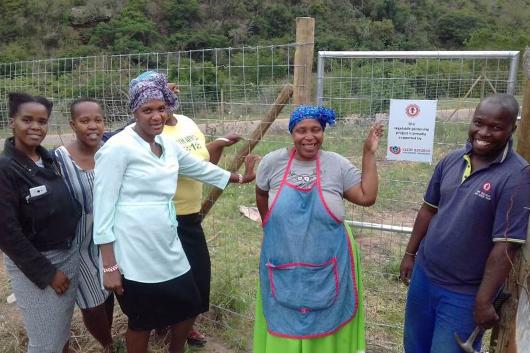
Czech Development Cooperation helps improve food security and water sustainability for grandmothers and HIV/AIDS Centre in KZN
27.11.2019 / 11:53 | Aktualizováno: 27.11.2019 / 12:43
(This article expired 31.01.2022.)
Vulnerable grandmothers (gogos) and grandfathers (mkhulus) living in the Valley of 1000 Hills, province of KwaZulu-Natal (South Africa) and the grandchildren in their care have seen their food security vastly improved this year thanks to generous support of the Embassy of the Czech Republic in Pretoria, South Africa. The Czech Development Cooperation grant, amounting to 300,000 CZK has enabled 13 large community gardens in KwaNyuswa, Embo, Molweni and Inanda to be fully fenced, providing 145 households with approximately 580 household members a much improved source of food and income security.
The households belong to the Hillcrest AIDS Centre Trust’s (HACT’s) Gogo Support programme, which works with more than 2000 grandmothers and grandfathers in a region where poverty is rife and HIV prevalence in some areas reaches 40%. Many of these grandparents are the sole breadwinners and rely on small scale subsistence agriculture through their gardens to feed their families.
The grant was given to HACT in February 2019 and provided fencing for 7,520m2 (equivalent to 1.9 acres or 0.75 hectares) of land space for communal food production. In addition to fencing communal gardens, the grant enabled HACT to expand its on-site Horticulture enterprises by funding a sustainable water system for its Izingadi Zethemba (‘Gardens of Hope’ in isiZulu) plant nursery which specializes in indigenous plants for drought management and substantial cost saving opportunities.
“We are so excited that we’ve at last been able to provide the fencing the grannies have needed for years,” said Gogo Support Programme Manager, Cwengi Myeni, “This is a dream come true for our gogos who just couldn’t afford to fence the gardens themselves. The gogos sell the excess vegetables from the gardens within the community for household income, which gives them economic security and reduces vulnerability to HIV, poverty and other social challenges. Having recently visited the newly fenced gardens, we are pleased to see that many are already bearing produce and proving more fruitful due to the protection the fencing gives from cattle and goats which roam around freely in these areas.”
“The new water pump system is brilliant,” said Plant Nursery Manager John Lund. “As incidence of drought increases across our nation, the timing of installing this system couldn’t be better! The system has enhanced our ability to harvest and use rain water and promote less water usage for the indigenous (low-water usage) plants we grow for sale. This is turn reduces our utilisation of Municipality water and makes our nursery more sustainable, minimising our environmental footprint.”
The greater sustainability of HACT’s plant nursery has also improved the job security of the primary breadwinners of HIV-impacted families from the surrounding communities. The nursery continues to grow vegetable seedlings for schools or community gardens as well as mother plants for the nursery.
“The Hillcrest AIDS Centre Trust, along with the grandparents and their households, want to thank the Czech Republic Development Cooperation for their generous support of this project which has added capacity and much needed resources to the Centre's efforts to empower local households and their families for healthier living,” said HACT CEO, Candace Davidson.
Notes to Editors
The Czech Development Cooperation grant fenced 7,520m2 (equivalent to 1.9 acres or 0.75 hectares) of land space for communal food production. The 13 gardens varied in size, from 115 to 1600m2, with an average garden size of 580m2, and included 12 grandmother-managed gardens and 1 grandfather-managed garden. On special request by a group of grandfathers, and supported by the grandmothers in the area, HACT also agreed to support one community garden operated by local grandfathers (mkhulus). After fencing was complete each of the 13 gardens were supplied with 20 bags of organic compost for improved soil quality and greater agricultural yield, as well as trays of assorted vegetable seedlings to assist with crop production. Essential gardening tools were also provided to the grandparents for the maintenance and upkeep of their gardens.
Contacts:
HACT Marketing & Fundraising team: Tel: +27 (0)31 765 5866 (Mon-Fr 8am-4pm) or email: fundraising@hillaids.org.za Cwengi Myeni: Gogo Support Programme Manager, email: grannies@hillaids.org.za
Background - Plant Nursery and Gogo Support Groups Programme
The aim of HACT’s Izingadi Zethemba “Gardens of Hope” Plant Nursery is to provide skills training, food security and sustainable job opportunities for local people living in disadvantaged communities who have been impacted by HIV/AIDs. It also contributes to the long-term sustainability of HACT by generating proceeds that are channelled back directly into the organisation’s non-profit projects and services: https://www.hillaids.org.za/hact-biz/hact-plant-nursery/
HACT’s Gogo (Granny) Support Groups programme provides psychosocial support as well as practical and sustainable skills development, training and economic empowerment opportunities to approximately 2000 gogos which includes a network of over 65 support groups across 12 rural communities: https://www.hillaids.org.za/what-we-do/hiv-support-family-strengthening/#gogo-support-groups
Hillcrest AIDS Centre Trust
Founded in 1990, the Hillcrest AIDS Centre Trust (HACT) is dedicated to saving and transforming lives. Our mission is to provide unconditional love and hope to all those impacted by HIV and AIDS. As one of the first NGO’s in South Africa to respond to the HIV/AIDS epidemic, HACT has established a reputation for making a significant and meaningful impact in the lives of people impacted by the disease. While our work and services continues to grow throughout KwaZulu-Natal, we primarily focus on serving the semi-rural and disadvantaged communities of the Valley of 1000 Hills region of KwaZulu-Natal, one of the epicentres of the global HIV/AIDS epidemic with HIV infection rates of up to 40% - more than double the current national average of 19% (South African National AIDS Council). For more information see: www.hillcrestaids.org.za/
Ms Candace Davidson, Chief Executive Officer, Hillcrest Aids Centre Trust





